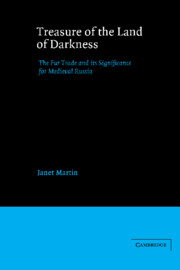Book contents
- Frontmatter
- Contents
- Maps
- To my parents
- Acknowledgements
- Note On Transliteration
- INTRODUCTION
- 1 BULGAR
- 2 THE RUS'
- 3 NOVGOROD: THE SQUIRREL FUR TRADE
- 4 MOSCOW AND KAZAN': THE LUXURY FUR TRADE
- 5 THE POLITICAL SIGNIFICANCE OF THE FUR TRADE
- 6 THE ECONOMIC SIGNIFICANCE OF THE FUR TRADE
- CONCLUSION
- Notes
- Bibliography
- Index
- Frontmatter
- Contents
- Maps
- To my parents
- Acknowledgements
- Note On Transliteration
- INTRODUCTION
- 1 BULGAR
- 2 THE RUS'
- 3 NOVGOROD: THE SQUIRREL FUR TRADE
- 4 MOSCOW AND KAZAN': THE LUXURY FUR TRADE
- 5 THE POLITICAL SIGNIFICANCE OF THE FUR TRADE
- 6 THE ECONOMIC SIGNIFICANCE OF THE FUR TRADE
- CONCLUSION
- Notes
- Bibliography
- Index
Summary
The fur trade, for which Muscovy became famous in the sixteenth century, had been in operation for centuries before the formation of the principality. That trade involved the transport of northern pelts – sable, ermine, marten, fox and squirrel – from the “land of darkness” (the northern regions stretching from Finland to the Ob’ river) to “all ends of the earth” (the Muslim East, the Byzantine Empire, North Africa, western Europe, and even to India and China). Within the fur trade network the particular centers responsible for accumulating northern fur and redistributing it varied through the ages, as did the sources and types of fur they collected and the consumers to whom they sold it. But through the foregoing examination of the vicissitudes of the fur trade centered around Bulgar-on-the-Volga, Kievan Rus'. Novgorod, and Moscow and Kazan’, several relatively consistent factors or patterns manifest themselves.
The first is perhaps the most obvious, but nevertheless is worthy of articulation. The fur trade persisted. Despite the numerous variations and transformations its elements underwent, despite its overall expansions and contractions, and despite shifts in the relative importance of its trade centers, the fur trade was a constant, ever-present economic factor in the Rus’ and mid-Volga lands throughout all the centuries considered in this study.
A second observable and constant factor regarding this trade is that it involved the sale of fur to foreign merchants for valuable commodities.
- Type
- Chapter
- Information
- Treasure of the Land of DarknessThe Fur Trade and its Significance for Medieval Russia, pp. 167 - 169Publisher: Cambridge University PressPrint publication year: 1986



